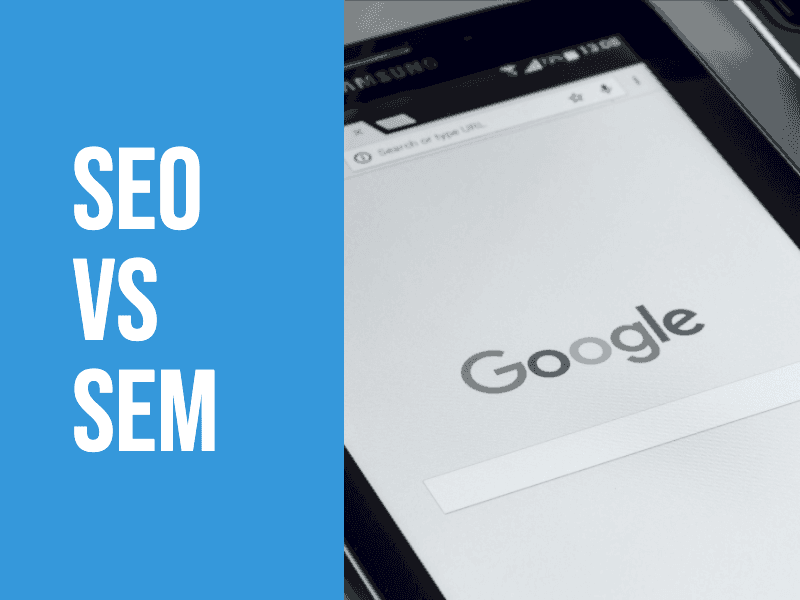SEM or SEO: differences
In digital marketing, it is very common to ask ourselves what is the ideal strategy to achieve better results engine rankings and get to the SEM x SEO clash.
The difference between Search Engine Marketing (SEM) and Search Engine Optimization (SEO) is very simple, but it can cause some misconceptions, especially for anyone who is just starting to invest or work in the field.
Therefore, we have prepared this article to show that, even though they are very close, these two strategies have some fundamental differences that must be taken into account.
In addition, we’ll also give you some important tips on how you can use them to get better results on Google. Keep reading and check it out!

SEM: a full marketing strategy for search engines
Search Engine Marketing is no more than the set of digital marketing strategies that aim to increase the visibility and traffic of a website by reaching the best placements in Google’s rankings and of other search engines as well.
But, contrary to what many may think, this does not mean that SEM is exactly the same as SEO.
Both have a similar goal, which is to get to the top of the search page. However, while the latter only works with techniques for organic search, the former also includes actions with sponsored links.
Therefore, SEM proposes a full marketing strategy for search engines, focusing on both ads and optimizations for organic results.
Sponsored links
Google Ads is one of the main tools used by SEM to achieve good results on Google in a fast and efficient way.
Immediately after choosing the right keywords and ad settings, your page will begin to appear in searches, before organic results, and start receiving new visitors/conversions.
Ads do not need to be made only for the Google search network. They can also reach new users by creating display, video, and app campaigns.
With the changes made to Google Ads (formerly called Google Adwords), products have become simpler and sponsored links can be optimized to reach the audience in an even more effective way.
It is worth remembering that since this is a paid strategy, you must have the resources to invest in the campaigns and pay for the billing system of the platform, which is known as Pay-Per-Click (PPC).
With this format, money is only debited from your account when a user clicks on your ad and is directed to your website.
Organic Search
The second strategy contemplated by the SEM is focused on achieving good results in an organic way and, therefore, it does not require any kind of financial investment in Google.
However, that does not mean it is easier than sponsored links. On the contrary, competition in the first places of the search engines is very heavy and it takes time for these platforms to recognize the authority of a website and display it at least on the first page.
The work is quite hard and the results take longer to show up, however there is a set of techniques that you can adopt to get a better placement in Google’s ranking.
These good practices form what we know as Search Engine Optimization (or SEO).
SEO: Appear in the first placements of Google in an organic way
SEO encompasses a set of techniques that are used by marketers to increase the relevancy of a website and improve its placement in Google’s ranking organically.
Unlike sponsored links, this strategy takes a little longer to show the expected results.
But when well applied, it can have long-lasting and very important effects on building your web authority, as there will be quality traffic without the need for ad spend.
The SEO is, therefore, an essential part of SEM strategy and a long-term differential to your website’s success.
As we saw in SEM, SEO is also divided into two important strategies: SEO On Page and SEO Off Page.
SEO On Page
SEO On Page is the set of optimizations that need to be done in the website so that it has more chances of achieving a better placement in Google’s ranking.
These adaptations should take into account both page content – which needs to make good use of keywords, be relevant and respond to user queries – as well as techniques related to website performance.
In other words, you need to worry about programming, loading time, responsive design, URL, meta description, meta tags and usability, among other aspects, because the user experience is also important for Google.
In our other blog article, we give tips on 4 good practices of SEO On Page that we have tested in Reportei and have generated incredible results for our website. Click here to check out!
SEO Off Page
SEO Off Page, on the contrary, is focused on the actions that are carried out outside your website, but which also contribute to the good organic results in search engines.
Some of them are:
- the link building, which happens when other pages insert links of your website in the content of them and, consequently, they recommend it;
- co-marketing, which seeks to partner with websites and blogs related to your business;
- and the guest post, which consists of producing and posting content for another website or blog, which generates both visibility for your brand and recommendation for your page.
SEM x SEO: which strategy is best for my business?
Now that you already know the differences between SEM and SEO, it is normal to ask which of the two strategies is most adequate for your business type or for your client’s company.
First, you must define what goals you want to achieve with your website and in how long you want to reach them.
If your purpose is to generate results in the short term, for example, the ideal is to invest in sponsored links and not direct your actions to SEO techniques only.
But if your goal is to gain relevance in Google in the medium/long term, optimization for organic searches should be your starting point.
For those who have the resources and desire to achieve the best results, immediate and long term, a full SEM strategy can guarantee an incredible return for both the present and the future.
If you liked our article on SEO x SEM, it is worth checking the 7 SEO tools you can not miss in building your strategy!


